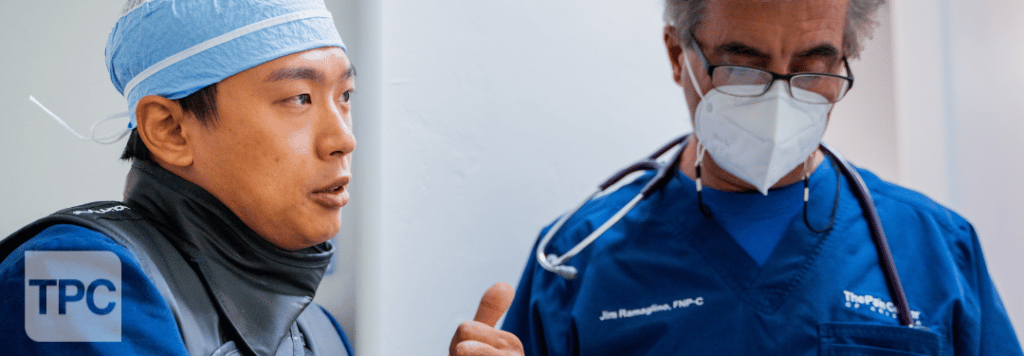Dr. Siwek’s Guide to Innovative Pain Management
We’ve all experienced pain – it’s an all-too-common aspect of the human experience, and there’s no shortage of ways that we feel it throughout our lives.
Unfortunately, some of us find ourselves with conditions that can elongate and intensify pain well beyond what’s typical, even to a debilitating degree.
Pain management is the field in which specialists take on the task of developing treatments for reducing and eliminating pain, and our pain specialists at The Pain Center are no different.

What is pain?
Pain is a discomforting sensation activated by your nervous system, signaling to you that there’s something wrong. The intensity of the sensation ranges from mild to severe, even debilitating. Pain can also vary in duration, the sensation being infrequent (start and stop) or long-lasting. It may develop suddenly and only last a short while, known as acute pain, or it may last over a matter of months and quite possibly several years – this is known as chronic pain.
Pain sensations can either be localized to one particular area or limb or generalized throughout your entire body, making it more or less difficult to know what’s exactly wrong. Although the cause of your pain may sometimes be easily diagnosable, there may be underlying, even serious health conditions that require a more thorough diagnosis and treatment.
Besides acute and chronic, other major pain categories include: nociceptive, inflammatory, neuropathic, and functional.
Common causes of pain include:
- Burns
- Cuts
- Bruises
- Stomach Ache/Cramps
- Sore Throat
- Headache
- Toothache
- Muscle Strain/Cramps
- Bone Fractures
- Arthritis
- Osteoarthritis
- Migraines
- Peripheral Neuropathy
What is pain management?
Pain, although it may have objective bodily causes, is quite subjective as pain tolerance differs from person to person. When the pain sensation becomes annoying enough or beyond your tolerance threshold, you’d typically seek relief from an over-the-counter remedy or treatment from a medical professional or pain management specialist – to manage your pain.
Pain management specialists diagnose the cause (or causes) of pain and provide various treatment options to aid in controlling your pain, including medications, surgical procedures, exercises, and therapies. Specialists will sometimes utilize multiple treatment options simultaneously depending on your particular condition and severity.
How pain management works
Once you’ve received a diagnosis from your pain management doctor, they will develop your pain management plan – the best treatment and/or therapy for your particular condition.
There are plenty of nonsurgical treatments pain doctors use, usually coinciding with therapies, that both reduce your need for medications as well as surgery.
Some of these include:
- Massage Therapy
- Weight Loss Plan
- Acupuncture
- Exercise Plan
- Yoga
- Meditation
- Physical Therapy
- Diet/Nutrition
- Chiropractic
In more severe pain cases, medications such as nonsteroidal anti-inflammatory drugs (NSAIDs), muscle relaxants, and antidepressants are typically prescribed for pain relief until a more permanent solution is found.
Some procedures available for the temporary relief of pain include:
- Epidural Steroid Injections
- Joint Injections
- Nerve Blocks
- Neuromodulation
- Radiofrequency Ablation
- Spinal Cord Stimulation
Surgery may be recommended if relief is yet to be found through the previous treatments and procures. Your pain doctor will coordinate with a team regarding the best approach to surgically treating your condition while maintaining present and ongoing pain relief until your procedure is complete.
Pain specialists like The Pain Center are innovators in state-of-the-art pain treatments, providing minimally invasive surgical procedures that can relieve you of the burden of your pain and give you a quick recovery so you can spring back into action in no time.
Myths and facts about pain management

Pain doctors typically prescribe opioids.
If opioids are prescribed, it’s typically for the short-term treatment of acute pain or in conjunction with a comprehensive treatment plan for ongoing chronic pain.
Common pain treatments include rehabilitation, injection, and non-opioid medications.
Opioids aren’t known to be successful in treating chronic pain in patients in the field of pain management.
Pain management is only for post-surgery recovery.
Surgery is not always a necessity when treating pain, even chronic pain. Pain management specialists are trained with various alternative treatments to surgery that have helped patients manage and overcome their pain without surgery.
Surgery is considered a last resort option for pain management.
Pain specialists don’t understand how my pain is affecting my life
Pain doctors see patients with various conditions, including those with chronic back or leg pain, arthritis, and cancer pain.
Your pain doctor is in it with you for the long haul, ensuring you’re getting the proper treatments to get you closer and closer to a pain-free life.
Opioids are the only medications that work for pain
There are plenty of non-opioid medications that can reduce pain, including:
- Nonsteroidal anti-inflammatory drugs (NSAIDs)
- Glucocorticoid corticosteroid medications
- Antidepressants
- Antiepileptic medications
Do you need a referral for pain management?
Most insurances require a referral for any coverage of services and treatments from a pain specialist. Referrals depend on whether you have a PPO or an HMO, whether you are using a provider within your network or not, and whether it’s an emergency.
Find out how to remedy your pain at The Pain Center.
The Pain Center offers comprehensive and innovative pain management, giving you the best chance at overcoming your pain and returning to a full and thriving life.
If you want your pain to finally go away, consult with one of our pain specialists today.
What Do Pain Management Doctors Do?
Experiencing chronic pain takes a toll on your body and mind, and it can be difficult to relate to others about what you’re experiencing if you happen to be the only one in your social circle suffering this way. Thankfully, there’s a whole field dedicated to you and your struggle with chronic pain, seeking out the best ways to manage, treat, and cure your pain for good.
What is a pain management doctor?
Pain management doctors are medical professionals who diagnose causes of pain, including any conditions that may be contributing to it. Once the cause and conditions of your pain have been identified, a comprehensive treatment strategy is then developed by your pain doctor. Their team of medical experts establishes a plan which may involve medicines, therapies, lifestyle modifications, and even surgeries (depending on the severity of your case).
These teams typically consist of:
- Doctors
- Nurses
- Nutritionists
- Physical Therapists
- Psychologists
- Occupational/Vocational Therapists
In some cases where conventional treatments aren’t effective, your pain doctor is trained to conduct their own studies and trials to find the best treatment for your particular pain context.
What is a pain management clinic?
A pain management clinic is a facility that specializes in treating pain, especially chronic pain and recurring pain caused by severe health conditions and diseases such as arthritis and cancer.

Types of pain management doctors
Effective pain management requires multiple disciplines for treating chronic pain and other serious conditions, also known as Interventional Pain Management.
Pain specialists will typically fall under these categories:
- Anesthesiology
- Interventional Radiology
- Physiatry
- Physical Therapy
When to see a pain doctor
When your pain lasts longer than three months, you’re experiencing a case of chronic pain. This means there’s an underlying issue in your body that, for some reason, isn’t letting up. A pain doctor will help identify and diagnose the cause of your pain and give you the treatment plan you need to alleviate, even eliminate, your ongoing suffering.
What conditions qualify for pain management?
Conditions that cause pain typically treated by pain management specialists include:
- Arthritis
- Osteoarthritis
- Gout
- Orthopedic Injuries
- Lupus
- Crohn’s Disease
- Back Injuries
- Herniated Disks
- Sciatica
- Fibromyalgia
- Complex Regional Pain Syndrome (CRPS)
- Central Pain Syndrome
- Endometriosis
- Facial Pain
- Trigeminal Neuralgia (TN)
- Abscessed Teeth
- Migraines
- Cluster Headaches
- Kidney Stones
- Interstitial Cystitis (Painful Bladder Syndrome)
- Nerve Damage
- Carpal Tunnel Syndrome
Does pain management really work?
Considering the holistic nature of effective pain management, it may take time for your treatment regimens and routines to relieve your pain and give you long-lasting results significantly. So long as you are in open, regular communication with your pain management doctor and team, they will be better equipped to adapt your plan until you experience optimal results.
Find relief at The Pain Center.
The Pain Center comprises some of the best pain management specialists the valley offers. If you’re looking to finally get relief from your pain, schedule an appointment with us today and let us help you begin your journey to recovery.
Types of Pain
There’s no shortage of ways in which we feel pain, but understanding it and when you should seek treatment will prevent you from the long-term effects of overlooking and ignoring it.
What are the two basic types of pain?
Nociceptive Pain
Nociceptive pain is caused by body tissue damage, typically manifesting as sharp, aching, or throbbing pain sensations. Nociceptors sense bodily harm throughout your musculoskeletal system, including muscle, skin, joints, bones, and tendons. This pain is similar to what you feel from an external injury like burning your skin or jamming your finger.
Typical injuries that trigger nociceptors include:
Neuropathic Pain
Neuropathic pain results from nerve damage or injury to the nerves that communicate between the brain and spinal cord, including those in your skin, muscles, and elsewhere in your body.
Causes of neuropathic pain include nerve damage or pressure from:
- Surgery
- Trauma
- Medication Side-Effects
- Viral Infections
- Cancer
- Vascular Malformations
- Alcoholism
- Multiple Sclerosis
- Diabetes
What are examples of neuropathic pain?
Pain sensations typical to neuropathic pain include:
- Intense pain
- Pins and needles sensation
- Numbness
- Difficulty sensing accurate temperature

What is chronic pain?
Chronic pain is when your nociceptive or neuropathic pain sensations last longer than three months, especially if it’s interfering with your quality of life. Whether it’s localized to one area of your body, your entire body, constant, or comes and goes, chronic pain can differ from person to person, depending on the underlying conditions causing your pain.
How does chronic pain affect the brain?
A side effect of chronic pain is ensuing anxiety, depression, and trouble sleeping, which compounds your pain. If your pain is disruptive enough to your life, making it challenging to maintain your pain tolerance, it can also lead to underlying health conditions.
How does chronic pain feel?
Pain sensations of chronic pain may include:
- Stiffness
- Aching
- Throbbing
- Squeezing
- Burning
- Shooting
- Stinging
What are examples of chronic pain?
Conditions that cause chronic pain include:
- Joint pain (Arthritis)
- Neck pain
- Back pain
- Tumor pain (Cancer)
- Headaches/ Migraines
- Testicular pain
- Scar tissue pain
- Muscle pain (Fibromyalgia)
- Nerve pain
What is the common cause of chronic pain?
Long-term illness, injury, or disease are common causes of chronic pain, as well as stress, anxiety, and depression (psychogenic and psychosomatic pain). Some patients have multiple conditions at once, causing their chronic pain.
Can stress and anxiety cause chronic pain?
Yes, stress and anxiety can cause chronic pain in the form of psychogenic or psychosomatic pain. Psychogenic and psychosomatic pain is believed to be caused by a lack of enough endorphins in the bloodstream needed to trigger positive feelings in the body.
Is chronic pain a disability?
Chronic pain is not a valid condition in the Social Security Administration’s (SSA) Blue Book. However, many medical conditions that cause chronic pain are. Therefore, the key factor in ensuring your chronic pain is valid before the SSA is a proper diagnosis of the underlying conditions causing it.
Who is most at risk for chronic pain?
According to a study by the Centers for Disease Control and Prevention (CDC), “Chronic pain and high-impact chronic pain both increased with age and were highest among adults aged 65 and over.”

Find pain relief at The Pain Center
If your or a loved one is struggling with debilitating chronic pain, The Pain Center is here to help.
We strive to innovate and find the best solutions for relieving pain for everyone, no matter your underlying health conditions.
Schedule an appointment with us today, and let’s begin your journey to recovery once and for all.
Innovative Chronic Pain Treatment
There is no direct cure for chronic pain, but diagnosing and treating the underlying health conditions, be it injury, illness, or disease, have proven to show results in relieving, even curing chronic pain in patients.
How is chronic pain treated?
Many ways to treat chronic pain exist, given that many conditions cause it. From medicines and therapy to surgery, there’s no shortage of ways your pain management team will try to tackle your pain. But treatment plans differ from person to person, given that although chronic pain is a widely shared struggle, there are countless causes and conditions for chronic pain among patients.
Common approaches for treating chronic pain include:
- Massage Therapy
- Weight Loss Plan
- Acupuncture
- Exercise Plan
- Yoga
- Meditation
- Physical Therapy
- Diet/Nutrition
- Chiropractic
- Epidural Steroid Injections
- Joint Injections
- Nerve Blocks
- Neuromodulation
- Radiofrequency Ablation
- Spinal Cord Stimulation

Why is chronic pain hard to treat?
Chronic pain can be challenging to treat because it isn’t always direct or clear as to what is causing the pain in the first place. Not only that, but there can be multiple conditions causing your pain as well. The difficulty of treating your chronic pain comes down to diagnosing the underlying conditions causing it.
What causes chronic pain to be different from acute pain?
Acute pain comes and goes fairly quickly, whereas chronic pain typically lasts longer than three months, even well beyond healing from an illness or injury.
What are innovative chronic pain treatments?
The Pain Center specializes in innovative, minimally invasive surgeries that take the best of pain research and apply it to treating and relieving your chronic pain. This gives you the best chance at relief and the quickest recovery time compared to standard pain surgeries today.
Minimally invasive pain surgeries offered by The Pain Center include:
TPC Disc
TPC Disc utilizes two distinct minimally invasive surgical solutions and one non-surgical solution for patients with discogenic pain that have failed to respond to conservative treatment.
TPC Intrathecal
TPC Intrathecal is a minimally invasive solution for chronic and refractory pain patients who have failed to respond to conservative treatments and therapies to deliver targeted drug therapy.
TPC Nerve Stim
TPC Nerve Stim is a nerve stimulation for conditions related to refractory chronic pain that have failed conservative therapies. Options include the dorsal root ganglion (DRG) or peripheral nerve solution, depending on the patient’s condition.
TPC Spine Decompress
TPC Spine Decompress is a spinal decompression for spinal stenosis secondary to ligamentum flavum hypertrophy, utilizing the MILD procedure (minimally invasive lumbar decompression).
TPC Sacral Fuse
TPC Sacral Fuse is a minimally invasive surgical solution providing stabilization for patients with sacroiliac joint dysfunction, utilizing three distinct minimally invasive surgical solutions for patients with sacroiliac joint dysfunction that have failed to respond to conservative treatments.
TPC Spine Fuse
TPC Spine Fuse is a minimally invasive spinal fusion solution for patients with conditions of spinal degeneration related to stenosis and spondylolisthesis.
TPC Spine Lift
TPC Spine Lift is a spinal decompression for spinal stenosis secondary to ligamentum flavum hypertrophy, utilizing the Vertiflex interspinous spacer device for patients with lumbar spinal stenosis with neurogenic claudication symptoms exacerbated by lumbar extension movements.
TPC Spine Stim
TPC Spine Stim is a minimally invasive spine solution of spinal cord stimulation for conditions related to chronic refractory pain that have failed conservative therapies.
What are the biggest misconceptions about chronic pain?

It comes with old age
Although pain is common, especially as your body grows older, chronic pain is an indicator of underlying health conditions that aren’t as common, so it’s not simply a matter of growing old but more of an indicator of a health condition that needs diagnosis and treatment.
Tough it out
Not only does this have no guarantee of relieving your pain, but there are plenty of standard and alternative treatments available for not only treating your chronic pain but potentially curing it.
Exercise only makes it worse
You might have some limitations on how you should exercise amid your condition. Still, exercise is typically part of a chronic pain treatment plan as it not only aids your body in healing but also supports your mental health.
Chronic pain can kill you
No, chronic pain can’t kill you, but the effects of it on your mental health can be serious if left unmanaged. Be sure to talk to those who support you, friends, family, and medical professionals, especially if you feel hopeless.
Innovative Pain Management at The Pain Center
We’re here to give you the best that pain management research has to offer in treating your chronic pain once and for all. Begin your journey to pain relief and schedule an appointment with us today.
Regenerative Medicine Treatments
Some underlying conditions that can cause severe chronic pain are thought to be incurable, including damaged intervertebral discs, ligament injuries, cartilage loss, etc. But thanks to the revolutionary field of regenerative medicine, such conditions may be overcome.
What is regenerative pain medicine?
Regenerative pain medicine utilizes elements naturally occurring in your body and concentrates them to repair aspects of your body that otherwise wouldn’t heal on their own.
Some of these elements include:
- Platelet Rich Plasma (PRP)
- Alpha-2-Macroglobulin (A2M)
- Bone Marrow Aspirated Concentrate (BMAC)

Which medical conditions can be treated with regenerative medicine?
PRP has been used to treat the likes of:
- Tendonitis
- Torn ligaments
- Muscle damage
- Some inflammation
A2M reduces degradation and promotes cartilage repair, especially in osteoarthritis patients.
BMAC is used in treating those suffering from more extreme cases of arthritis that haven’t found success with standard treatments.
Does stem cell therapy work for chronic pain?
Stem cell therapy utilizes harvested stem cells from your bone marrow and redirects them to your body’s problematic area that needs healing, reducing inflammation, and promoting tissue regeneration and repair.
How long does it take for regenerative medicine to work?
Depending on your particular condition and the type of regenerative medicine you received, it may take several weeks or months to notice maximal results from your treatment.
Does insurance cover stem cell therapy?
Some insurances may cover certain types of stem cell therapy, but it’s typically considered an experimental treatment. Therefore, it’s less likely to be covered by your insurance company.
Regenerative Pain Therapies at The Pain Center
Here at The Pain Center, we specialize in cutting-edge pain treatments and technologies, giving you the best chance at finding pain relief for good.
Our team of pain specialists will aid in diagnosing and managing your pain, utilizing the best treatments available for your particular case.
Schedule an appointment with us today, and we’ll get you started on your journey to recovery.
How to Find Pain Management Near Me
Chronic pain is nothing to be ignored.
Pain is an indicator of something wrong with your body, typically an underlying condition that needs to be addressed for your overall health and quality of life.

Can anything be done for chronic pain?
Thankfully, there are ways to manage and overcome your pain, either by treating it in a way that reduces your daily pain or even curing it for good by identifying and treating the underlying health conditions causing your pain.
Our pain management doctors and specialists at The Pain Center are trained in state-of-the-art treatments and surgeries, giving you the best chance at relieving your pain than any other pain clinic in Arizona.
What treatments are available for chronic pain?
Our pain treatments for chronic pain include:
- Radiofrequency Ablation
- Epidural Steroid Injections
- Facet Joint Injections
- Medial Branch Blocks
- Sacroiliac Joint Injections
- Peripheral Nerve Injections
- Joint Injections
- Tendon/ Bursa Injections
- Sympathetic Nerve Blocks
- Discogram
- Trigger Point Injections
- Bracing
- Physical Therapy
- Medications
When should you seek help for chronic pain?
Chronic pain typically lasts at least three months, but if you’re in pain and it’s disrupting your quality of life, there’s no point in letting it linger any longer than necessary.
And when it comes to surgery, it’s a last resort – there are plenty of treatments, therapies, and alternative options before rushing to treat your pain with a surgical procedure.

Chronic pain relief at The Pain Center
We see how debilitating pain can be for all our patients from all walks of life and with all kinds of health conditions, and we want you to find relief as well.
We’ve researched and developed treatments and minimally invasive pain surgeries that give all of us the best chance to regain control of our lives from the nuisance of daily, debilitating chronic pain.
If you or a loved one are suffering, schedule an appointment with us today.
